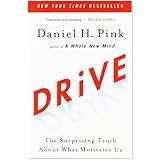
Drive: The Surprising Truth About What Motivates Us by Daniel Pink is a must-read for educators and parents alike. Dan summarizes current research and does a great job turning it into interesting and understandable prose that educators can apply to their practice. Every school should have this on the shelf.
Three Types of Motivation
- 1.0 – The basic motivations we need for survival
- 2.0 – Motivations based on direct rewards and punishments. Such carrots and sticks are typically financial in this context. They work for jobs that are routine, which are often the jobs that can be sent offshore or done by a computer.
- 3.0 – Intrinsic motivation, which is conducive to creativity. This allows you to do things for the satisfaction of doing them rather than any monetary reward. Examples include open source software, Wikipedia, learning to play a musical instrument, or doing a puzzle. It is important for nonroutine (heuristic) jobs. In these jobs rules are loosely defined, which requires creativity.
Carrots and Sticks Don’t Always Work
- Pink sites 128 studies that lead to the conclusion that tangible rewards tend to have a substantially negative effect on intrinsic motivation. This is one of the most robust findings in social science and one of the most ignored. (Doug: Educators should check out Alfie Khon’s 1993 book, Punished by Rewards.)
- Studies show that rewards and punishments can extinguish motivation and diminish performance. They focus behavior, which can crush creativity and they can crowd out good behavior. In some cases, they can lead to cheating, shortcuts, unethical behavior and lead to addiction. They can foster short-term thinking at the cost of long-term results.
Carrots and Sticks Aren’t All Bad
- Rewards do not undermine people’s intrinsic motivation for dull tasks where there isn’t any motivation to be undermined. To increase chances for success you need to: 1) Offer a rationale for why the task is important 2) Acknowledge that the task is boring 3) Allow people to complete the task their own way. Another way to offer extrinsic rewards for creative work is to give the reward after the job is finished. Care must be taken so that such rewards don’t become expected. In general, praise and specific positive feedback are less corrosive than cash and trophies (Doug: That means stickers for you elementary teachers)
DrDougGreen.com If you like the summary, buy the book
Tags: Daniel Pink, Drive, Motivation





